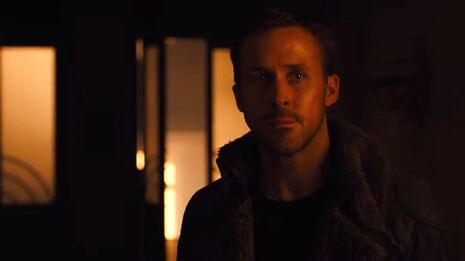VisCourse: A sign of the times
Zoe Black gets to grips with the marketing and cultural implications of Denis Villeneuve’s recently released Blade Runner 2049 teaser trailer

Blade Runner, directed by Ridley Scott and originally released in 1982, is a genre-defying masterpiece, expertly employing elements of sci-fi fantasy to create a work which is dark and poignant, playing as it does on the anxieties of 1980s America. It, along with the Indiana Jones series, launched the career of Harrison Ford outside of Star Wars, and provided the perfect counterpoint to the upbeat optimism of George Lucas’s franchise. It has become a cult classic and the influence of its tonally-muted dystopian megacity aesthetic can be seen in almost every modern sci-fi film.
"The hype machine is gearing up, preparing to exhaust us with yet another round of incessant advertising"
And now, like every successful film from before the year 2000, this visionary, original piece is being made to bear the weight of a reboot/sequel. It’s not difficult to see why this is the case: in the top ten highest grossing films of 2016 only two films are completely standalone, Zootopia and The Secret Life of Pets, although the latter is a Toy Story rip-off. The others in the list include sequels (Captain America: Civil War takes the top spot), reboots (The Jungle Book) and films which take place in pre-existing cinematic universes (Fantastic Beasts and Where to Find Them). This latter category is what every major studio is currently trying to milk: six of the ten films form part of one of these universes, such as two Marvel releases and two DC, and the list doesn’t even include Rogue One: A Star Wars Story yet. This is not to say that non-standalone films are inherently bad, but that they necessarily involve a lack of originality which means that audiences are constantly offered passable, bland films. For more on this idea, please watch Nerdwriter's video on the epidemic of passable movies.
It is in this context that the trailer for Blade Runner 2049 has been released, a staggering 10 months before its release date. The hype machine is gearing up, preparing to exhaust us with yet another round of incessant advertising. Nevertheless, in order to keep one’s sanity, projects such as this must be taken seriously and looked forward to with an open mind. A sequel for Blade Runner has in fact been in the works since 1999, and 2049 will be directed by rising star Denis Villeneuve (Sicario, Arrival), which are reasons to feel that there is some artistic integrity behind the creation of this film. The participation of Villeneuve and cinematographer Roger Deakins is one of the factors which convinced lead Ryan Gosling to sign on, an actor famed for his astute choices in projects.
Apart from my disagreeing with the existence of a trailer at all at this early stage, I must concede that it is largely inoffensive. Ryan Gosling has a long coat to recall Harrison Ford from the original film and his face is obscured for most of the trailer, ostensibly to create suspense, but perhaps also so as not to jolt us with the recognition of his celebrity. We see him pass through typically dystopic settings; for example, a Mad Max desert landscape reveals an Ozymandias-type statue. The climax of the 90-second clip is a meeting between Ford and Gosling, which informs us that this will definitely be a sequel and not a reboot, such as this year’s ill-fated Ghostbusters. Perhaps the familiarity of the scenes ought to remind us of the massive impact of the original film, though one can’t help longing for something slightly more new. Its format is reminiscent of the Star Wars: The Force Awakens teaser trailer, which is of a similar length and which also landed a year before the film’s release date. As with the The Force Awakens teaser, all this 2049 clip really offers is a sequence of attention-grabbing images with minimal plot detail and several reminders of the heritage that the film will be making use of. It’s a successful formula which at least acknowledges the intelligence of its viewers by not spelling out each plot beat (see the Batman v Superman or Passengers trailers for examples). No judgement of the final product can be made at this early stage, but it is interesting to consider the cultural implications of a teaser trailer being released for a sequel to a film which came out almost four decades ago
 News / Police to stop searching for stolen Fitzwilliam jade17 April 2024
News / Police to stop searching for stolen Fitzwilliam jade17 April 2024 Interviews / ‘It fills you with a sense of awe’: the year abroad experience17 April 2024
Interviews / ‘It fills you with a sense of awe’: the year abroad experience17 April 2024 News / Night Climbers call for Cambridge to cut ties with Israel in new stunt15 April 2024
News / Night Climbers call for Cambridge to cut ties with Israel in new stunt15 April 2024 Sport / Kabaddi: the ancient sport which has finally arrived in Cambridge17 April 2024
Sport / Kabaddi: the ancient sport which has finally arrived in Cambridge17 April 2024 Features / Cambridge’s first Foundation Year students: where are they now?7 April 2024
Features / Cambridge’s first Foundation Year students: where are they now?7 April 2024





